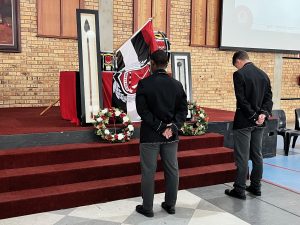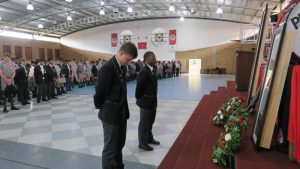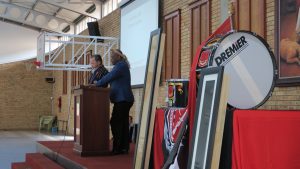

Today (22 January) marks the 146th anniversary of the Battle of Isandlwana, fought from late morning to mid-afternoon on this day in 1879 in the Anglo-Zulu War between the invading British Forces under Lord Chelmsford and the Zulu Army of King Cetshwayo.
On the left of the stage at the cultural assembly this morning was a display made up not only of some old school drums from long ago and the College flag, but also a carbine from that period and an assegai and a knobkerrie that were both used at that great battle.
Donated to College by the Colenbrander family, they were carried into the battle by the warrior, Nondawani Sheba, and are the only Zulu weapons from that battle in the world that are linked to an identified warrior.
In the battle itself, a force of about 20,000 Zulu warriors attacked and then wiped out a portion of the main British invasion force, and over 1 300 soldiers of the British crown were killed, including seven colonial volunteers educated at the old Pietermaritzburg High School (later Maritzburg College).
The sacrifice of our seven Old Boys was immortalised at this school when the great headmaster of College, Mr RD Clark, chose the words PRO ARIS ET FOCIS as the school’s motto – from the very war memorial in Clark’s that he had erected to honour their deaths protecting ‘Hearth & Home’.
But today, inspired by the school’s sacred symbolism of carbine and assegai and red-black-white, we also honour the memory of the thousands of brave Zulu warriors, who also died on that bloody day.

Mr SJ Mhlongo: Kodwa namuhla, sigqugquzelwa uphawu olungcwele lwesikole lwe-carbine ne-assegai kanye ne-red-black-white, sihlonipha futhi inkumbulo yezinkulungwane zamaqhawe amaZulu anesibindi, nawo afa ngalolo suku olwaluchitha igazi.
After all, let us be mindful that these Zulu warriors died defending the sacred soil of Zululand from an invading force – they died defending their homesteads, their farms and their kraals. They, too, died defending their ‘hearths and homes’.
One wonders what the final moments were like, for all the men who died that day.
For the warriors of the Amabutho, armed only with assegais, they rose up and charged the British camp, in the face of withering fire from 1 000 Martini-Henry rifles.
Mr Mhlongo: Kumaqhawe ebutho Amabutho, ehlome ngezikhali kuphela, asukuma ahlasela inkambu yamaNgisi, phambi komlilo ovuthayo wezibhamu eziyi-1 000 ze-Martini-Henry.
What courage it must have taken, to keep moving forward, as their comrades around them were shot.
And what of the ‘redcoats’, as the British line collapsed under the Zulu onslaught, and in a matter of only a few minutes the camp was overrun by the warriors of Cetshwayo?
Within those few minutes, they would have realised that all was lost, that there was no hope of escape, and the only end for them was going to be at the tip of an assegai like this one here.
We know that many of our Old Boys banded together in a tight square, back to back, and fought to the end, until they were overrun and killed.
Not a single soldier of the British line survived.
We salute the memory of ALL the men who gave their lives on that bloody battlefield in Zululand, and, on its traditional birthday, specifically chosen by Mr Clark in honour of that momentous and bloody day, we also honour the 128th birthday today of the Maritzburg College Old Boys’ Association.
Mr Mhlongo: Masisukume futhi sithule sikhumbule izinkulungwane zamadoda ezinhlangothini zombili alahlekelwa izimpilo zawo kuleyo mpi enkulu, osekulesi sikole manje osekuwuphawu lwaphakade lomsebenzi ohloniphekile, isibindi, ubunye kanye nokuthethelela.
Mr Marwick: PRO ARIS ET FOCIS
Mr Mhlongo: FOR HEARTH & HOME
Mr Mhlongo: OKWESIBAYA NOMSAMO

